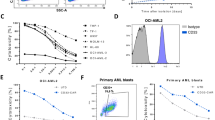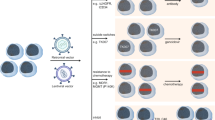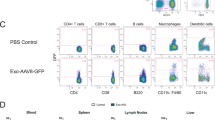Abstract
We investigated the potential efficacy of treating adult T-cell leukemia (ATL) using a gene therapeutic approach involving the use of a herpes simplex virus–thymidine kinase (HSV-TK)-mediated suicide system. Human immunodeficiency virus (HIV)-based vectors containing the HSV-TK gene were constructed to achieve targeted gene transfer into CD4-positive ATL cells, after which the transduced cells were selectively killed by treatment with ganciclovir (GCV). To examine the utility of HIV vectors in vivo, ATL-NOD-SCID mice were prepared by intraperitoneal injection of 1 × 107 MT2 cells into NK-depleted nonobese diabetic/severely compromised immunodeficient (NOD-SCID) mice. Thereafter, 1 ml of concentrated HIV vector expressing HSV-TK (HXCTKN) or GFP (HXGFP) stock was injected into the intraperitoneal cavity, and GCV was administered twice a day for 5 days. Fluorescence-activated cell sorting (FACS) analysis showed that 7–11% of MT2 or HUT102 cells recovered from the peritoneal cavity were transduced with the HXGFP. After 3 weeks, plasma sIL2-Rα levels were significantly lower in mice administered HXCTKN than in those administered HXGFP. Moreover, HXCTKN-injected mice survived significantly longer than HXGFP-injected mice. Taken together, these findings suggest that HIV vectors could be used for in vivo targeted gene transfer into ATL cells and could thus serve as the basis for the development of effective new therapies for the treatment of ATL.
This is a preview of subscription content, access via your institution
Access options
Subscribe to this journal
Receive 12 print issues and online access
$259.00 per year
only $21.58 per issue
Buy this article
- Purchase on Springer Link
- Instant access to full article PDF
Prices may be subject to local taxes which are calculated during checkout




Similar content being viewed by others
References
Hinuma Y, Nagata K, Hanaoka M, Nakai M, Matsumoto T, Kinoshita KI et al. Adult T-cell leukemia: antigen in an ATL cell line and detection of antibodies to the antigen in human sera. Proc Natl Acad Sci USA 1981; 78: 6476–6480.
Shimoyama M . Diagnostic criteria and classification of clinical subtypes of adult T-cell leukaemia–lymphoma. A report from the lymphoma Study Group (1984–87). Br J Haematol 1991; 79: 428–437.
Kinoshita T, Hotta T, Tobinai K, Kobayashi T, Ishizuka N, Tomonaga M et al. A randomized controlled trial investigating the survival benefit of dose-intensified multidrug combination chemotherapy (LSG9) for intermediate- or high-grade non-Hodgkin's lymphoma: Japan Clinical Oncology Group Study 9002. Int J Hematol 2004; 80: 341–350.
Yamada Y, Tomonaga M, Fukuda H, Hanada S, Utsunomiya A, Tara M et al. A new G-CSF-supported combination chemotherapy, LSG15, for adult T-cell leukaemia–lymphoma: Japan Clinical Oncology Group Study 9303. Br J Haematol 2001; 113: 375–382.
Kami M, Hamaki T, Miyakoshi S, Murashige N, Kanda Y, Tanosaki R et al. Allogeneic haematopoietic stem cell transplantation for the treatment of adult T-cell leukaemia/lymphoma. Br J Haematol 2003; 120: 304–309.
Okamura J, Utsunomiya A, Tanosaki R, Uike N, Sonoda S, Kannagi M et al. Allogeneic stem-cell transplantation with reduced conditioning intensity as a novel immunotherapy and antiviral therapy for adult T-cell leukemia/lymphoma. Blood 2005; 105: 4143–4145.
Harasawa H, Yamada Y, Kudoh M, Sugahara K, Soda H, Hirakata Y et al. Chemotherapy targeting methylthioadenosine phosphorylase (MTAP) deficiency in adult T cell leukemia (ATL). Leukemia 2002; 16: 1799–1807.
Tsukasaki K, Tobinai K, Shimoyama M, Kozuru M, Uike N, Yamada Y et al. Deoxycoformycin-containing combination chemotherapy for adult T-cell leukemia–lymphoma: Japan Clinical Oncology Group Study (JCOG9109). Int J Hematol 2003; 77: 164–170.
Ezaki K, Hirano M, Ohno R, Yamada K, Naito K, Hirota Y et al. A combination trial of human lymphoblastoid interferon and bestrabucil (KM2210) for adult T-cell leukemia–lymphoma. Cancer 1991; 68: 695–698.
Hermine O, Dombret H, Poupon J, Arnulf B, Lefrere F, Rousselot P et al. Phase II trial of arsenic trioxide and alpha interferon in patients with relapsed/refractory adult T-cell leukemia/lymphoma. Hematol J 2004; 5: 130–134.
Waldmann TA, White JD, Carrasquillo JA, Reynolds JC, Paik CH, Gansow OA et al. Radioimmunotherapy of interleukin-2R alpha-expressing adult T-cell leukemia with Yttrium-90-labeled anti-Tac. Blood 1995; 86: 4063–4075.
Zhang Z, Zhang M, Goldman CK, Ravetch JV, Waldmann TA . Effective therapy for a murine model of adult T-cell leukemia with the humanized anti-CD52 monoclonal antibody, Campath-1H. Cancer Res 2003; 63: 6453–6457.
Barzon L, Zanusso M, Colombo F, Palu G . Clinical trials of gene therapy, virotherapy, and immunotherapy for malignant gliomas. Cancer Gene Ther 2006; 13: 539–554.
Gottesman MM . Cancer gene therapy: an awkward adolescence. Cancer Gene Ther 2003; 10: 501–508.
Mullen CA, Kilstrup M, Blaese RM . Transfer of the bacterial gene for cytosine deaminase to mammalian cells confers lethal sensitivity to 5-fluorocytosine: a negative selection system. Proc Natl Acad Sci USA 1992; 89: 33–37.
Bi WL, Parysek LM, Warnick R, Stambrook PJ . In vitro evidence that metabolic cooperation is responsible for the bystander effect observed with HSV tk retroviral gene therapy. Hum Gene Ther 1993; 4: 725–731.
Culver KW, Ram Z, Wallbridge S, Ishii H, Oldfield EH, Blaese RM . In vivo gene transfer with retroviral vector-producer cells for treatment of experimental brain tumors. Science 1992; 256: 1550–1552.
Shimada T, Fujii H, Mitsuya H, Nienhuis AW . Targeted and highly efficient gene transfer into CD4+ cells by a recombinant human immunodeficiency virus retroviral vector. J Clin Invest 1991; 88: 1043–1047.
Maddon PJ, Dalgleish AG, McDougal JS, Clapham PR, Weiss RA, Axel R . The T4 gene encodes the AIDS virus receptor and is expressed in the immune system and the brain. Cell 1986; 47: 333–348.
Miyake K, Miyake N, Shimada T . Development of targeted gene transfer into human primary T lymphocytes and macrophages using high-titer recombinant HIV vectors. J Biotechnol 2007; 129: 532–538.
Moolten FL . Tumor chemosensitivity conferred by inserted herpes thymidine kinase genes: paradigm for a prospective cancer control strategy. Cancer Res 1986; 46: 5276–5281.
Freeman SM, Abboud CN, Whartenby KA, Packman CH, Koeplin DS, Moolten FL et al. The ‘bystander effect’: tumor regression when a fraction of the tumor mass is genetically modified. Cancer Res 1993; 53: 5274–5283.
Hogquist KA, Nett MA, Unanue ER, Chaplin DD . Interleukin 1 is processed and released during apoptosis. Proc Natl Acad Sci USA 1991; 88: 8485–8489.
Tiberghien P, Reynolds CW, Keller J, Spence S, Deschaseaux M, Certoux JM et al. Ganciclovir treatment of herpes simplex thymidine kinase-transduced primary T lymphocytes: an approach for specific in vivo donor T-cell depletion after bone marrow transplantation? Blood 1994; 84: 1333–1341.
Dilber MS, Abedi MR, Bjorkstrand B, Christensson B, Gahrton G, Xanthopoulos KG et al. Suicide gene therapy for plasma cell tumors. Blood 1996; 88: 2192–2200.
Colombo F, Barzon L, Franchin E, Pacenti M, Pinna V, Danieli D et al. Combined HSV-TK/IL-2 gene therapy in patients with recurrent glioblastoma multiforme: biological and clinical results. Cancer Gene Ther 2005; 12: 835–848.
Huber BE, Richards CA, Krenitsky TA . Retroviral-mediated gene therapy for the treatment of hepatocellular carcinoma: an innovative approach for cancer therapy. Proc Natl Acad Sci USA 1991; 88: 8039–8043.
Oldfield EH, Ram Z, Culver KW, Blaese RM, DeVroom HL, Anderson WF . Gene therapy for the treatment of brain tumors using intra-tumoral transduction with the thymidine kinase gene and intravenous ganciclovir. Hum Gene Ther 1993; 4: 39–69.
Zeng ZJ, Li ZB, Luo SQ, Hu WX . Retrovirus-mediated tk gene therapy of implanted human breast cancer in nude mice under the regulation of Tet-On. Cancer Gene Ther 2006; 13: 290–297.
Garver Jr RI, Goldsmith KT, Rodu B, Hu PC, Sorscher EJ, Curiel DT . Strategy for achieving selective killing of carcinomas. Gene Therapy 1994; 1: 46–50.
Vile RG, Nelson JA, Castleden S, Chong H, Hart IR . Systemic gene therapy of murine melanoma using tissue specific expression of the HSVtk gene involves an immune component. Cancer Res 1994; 54: 6228–6234.
Osaki T, Tanio Y, Tachibana I, Hosoe S, Kumagai T, Kawase I et al. Gene therapy for carcinoembryonic antigen-producing human lung cancer cells by cell type-specific expression of herpes simplex virus thymidine kinase gene. Cancer Res 1994; 54: 5258–5261.
Baum C, Kustikova O, Modlich U, Li Z, Fehse B . Mutagenesis and oncogenesis by chromosomal insertion of gene transfer vectors. Hum Gene Ther 2006; 17: 253–263.
Barba D, Hardin J, Sadelain M, Gage FH . Development of anti-tumor immunity following thymidine kinase-mediated killing of experimental brain tumors. Proc Natl Acad Sci USA 1994; 91: 4348–4352.
Wilkie NM, Clements JB, Boll W, Mantei N, Lonsdale D, Weissmann C . Hybrid plasmids containing an active thymidine kinase gene of Herpes simplex virus 1. Nucleic Acids Res 1979; 7: 859–877.
Mosmann T . Rapid colorimetric assay for cellular growth and survival: application to proliferation and cytotoxicity assays. J Immunol Methods 1983; 65: 55–63.
Miyake K, Iijima O, Suzuki N, Matsukura M, Shimada T . Selective killing of human immunodeficiency virus-infected cells by targeted gene transfer and inducible gene expression using a recombinant human immunodeficiency virus vector. Hum Gene Ther 2001; 12: 227–233.
Acknowledgements
We thank T Akagi and S Tanozaki for providing the ATL cells. We also thank K Tamayose, H Matsuoka and K Akiyama for technical assistance. This work was supported in part by grants from the Ministry of Health, Labour and Welfare of Japan, and the Ministry of Education, Culture, Sports, Science and Technology of Japan.
Author information
Authors and Affiliations
Corresponding author
Rights and permissions
About this article
Cite this article
Miyake, K., Inokuchi, K., Miyake, N. et al. HIV vector-mediated targeted suicide gene therapy for adult T-cell leukemia. Gene Ther 14, 1662–1667 (2007). https://doi.org/10.1038/sj.gt.3303024
Received:
Revised:
Accepted:
Published:
Issue Date:
DOI: https://doi.org/10.1038/sj.gt.3303024



